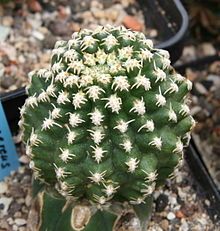Pygmaeocereus bieblii
| Pygmaeocereus bieblii | |
|---|---|

| |
| Scientific classification | |
| Kingdom: | Plantae |
| Clade: | Tracheophytes |
| Clade: | Angiosperms |
| Clade: | Eudicots |
| Order: | Caryophyllales |
| Family: | Cactaceae |
| Subfamily: | Cactoideae |
| Tribe: | Cereeae |
| Subtribe: | Trichocereinae |
| Genus: | Pygmaeocereus |
| Species: | P. bieblii
|
| Binomial name | |
| Pygmaeocereus bieblii Diers
| |
| Synonyms[1] | |
| |
Pygmaeocereus bieblii, synonym Haageocereus bieblii, is a species of cactus from Peru.[1][2]
Description
[edit]Pygmaeocereus bieblii grows individually with spherical, green shoots up to 5 cm (2.0 in) in diameter that barely protrude from the ground. The 10 to 25 barely recognizable ribs are divided into wart-like humps. The single central spine, which is 2 to 4 mm (0.079 to 0.157 in) long and 1 mm (0.039 in) in diameter, may also be missing. The 3 to 10 comb-shaped radial spines are white to dark yellow and 1 to 1.5 mm (0.039 to 0.059 in) long.
The broad, funnel-shaped, white flowers are 6 to 7 cm (2.4 to 2.8 in) long and 4.5 to 6 cm (1.8 to 2.4 in) in diameter. Its flower tube is long and slender. The 6 to 10 mm (0.24 to 0.39 in) long fruits are greenish red to brownish.[3]
Taxonomy
[edit]The first description was made in 1995 by Lothar Diers.[4] The specific epithet bieblii honors the German cactus collector Wolfgang Biebl.
Subspecies
[edit]As of December 2024[update], Plants of the World Online accepted two subspecies:[1]
- Pygmaeocereus bieblii subsp. bieblii
- Pygmaeocereus bieblii subsp. kuehhasii (Diers) Ostolaza
Distribution
[edit]Pygmaeocereus bieblii is distributed in the Ancash region of Peru, northwest of Huaraz, at altitudes of 600 to 1800 meters.
References
[edit]- ^ a b c "Pygmaeocereus bieblii Diers". Plants of the World Online. Royal Botanic Gardens, Kew. Retrieved 2024-12-28.
- ^ "Pygmaeocereus bieblii in Tropicos".
- ^ Anderson, Edward F.; Eggli, Urs; Anderson, Edward F. (2005). Das große Kakteen-Lexikon (in German). Stuttgart (Hohenheim): Ulmer. p. 556. ISBN 3-8001-4573-1.
- ^ "Au Cactus Francophone :". Au Cactus Francophone (in French). Retrieved 2023-09-19.
External links
[edit] Media related to Pygmaeocereus bieblii at Wikimedia Commons
Media related to Pygmaeocereus bieblii at Wikimedia Commons Data related to Pygmaeocereus bieblii at Wikispecies
Data related to Pygmaeocereus bieblii at Wikispecies

